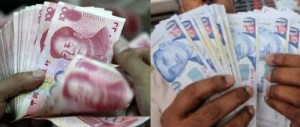China, Singapore to allow direct trading between currencies

China and Singapore have agreed to allow direct trading between each other’s currency (yuan and Singapore dollar), Singapore’s central bank said Tuesday. AFP file photo
SINGAPORE—China and Singapore have agreed to allow direct trading between each other’s currency, Singapore’s central bank said Tuesday.
The move, along with other agreements on financial cooperation, is expected to bolster Singapore’s status as a leading offshore trading center for the Chinese yuan, officially called the renminbi(RMB).
“China and Singapore will introduce direct currency trading between the Chinese yuan and Singapore dollar,” the Monetary Authority of Singapore (MAS) said in a statement, adding that details will be announced separately.
The statement was issued after a meeting between senior officials from both countries led by Singapore Deputy Prime Minister Teo Chee Hean and visiting Chinese Vice Premier Zhang Gaoli.
China will also grant Singapore-based investors a 50 billion yuan ($8.2 billion) investment quota under its Renminbi Qualified Foreign Institutional Investor program, MAS said.
Article continues after this advertisementThis would allow investors based in the city-state to use the yuan to invest in Chinese stocks and bonds.
Article continues after this advertisementThe program “will help to diversify the base of investors in China’s capital markets and promote adoption of the RMB for investment”, MAS said.
Chinese institutional investors will also be allowed to use the yuan to invest in Singapore’s capital markets.
“The new initiatives will further promote the international use of the renminbi through Singapore,” the MAS said.
Its managing director Ravi Menon added: “Financial ties between the two countries have deepened considerably and Singapore is well placed to promote greater use of the RMB in international trade and investment in the years to come.”
China’s rise as the world’s second-biggest economy has seen the yuan take on a bigger role in international financial markets.
Britain last week said that direct trading between the yuan and the British pound will be allowed.
China also has similar direct trading arrangements for the yuan with the US dollar, the Japanese yen and the Australian dollar.